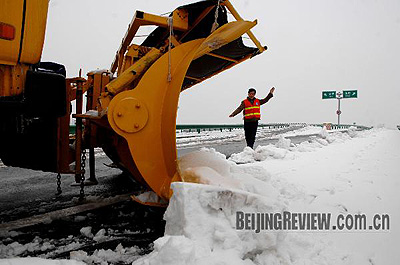|

Heavy snowstorms throughout the central and southern provinces of China are the result of extreme weather conditions at a global level and the occurrence of La Niña, said Xu Xiaofeng, Vice Director of the China Meteorological Administration, in an interview with the China Central Television (CCTV).
In snow-devastated regions people have been busy clearing roads and restoring suspended electricity supplies. Their work is likely to continue as snowfalls are expected to last until the end of January.
As the worst hit province, Hubei had reported 14 deaths up to January 21, including nine who died in traffic accidents. At least 7.8 million people in Hubei, over one eighth of its total population, had been affected by the heavy snowfall as of January 21. Of the 481,300 hectares of farmland damaged by the weather, 37,900 hectares have been rendered fruitless. Thousands of houses were also toppled by the snow. The direct economic loss in Hubei so far is estimated to be around 1.43 billion yuan ($199 million).
In the central province of Anhui at least 3 million people have been affected by the continuous snowfall, including residents of dozens of townships in the mountainous areas, where traffic, power supplies and telephone services were cut off.
Since January 10, Shaanxi Province has witnessed its heaviest snowfall in the last five decades. A total of 27,760 vegetable greenhouses have been damaged by the snowstorms. While some greenhouses with plastic roofs collapsed under the weight of snow, the growth of plants in the remaining ones has been retarded by low temperatures, high humidity levels and weak sunlight.
Freezing temperatures have caused numerous accidents involving the failure of public infrastructure, which is not designed for the unusually harsh weather. Frozen water pipes burst in Wuhan, capital city of Hubei Province, causing drinking water shortages for more than 100,000 people. To restore supply, the city's water bureau deployed nearly 4,000 water tankers and 15,200 workers to repair broken pipes.
According to a report on CCTV on January 22, road traffic in 16 provinces, autonomous regions and municipalities had been affected by heavy snowfall. Freeways in these affected regions were closed down so that sand and salt could be dispersed on the ground to remove the ice on the road. Snow and icy weather has also delayed over 600 flights taking off from 17 airports. The CCTV report said the General Administration of Civil Aviation had intensified safety supervision at airports, making sure that there is no snow or ice on the take-off and landing runways in operation.
Paralyzed freeway networks and closed airports have made many people flock to railways, which are less affected by bad weather. To deal with the surge in passenger numbers, the Ministry of Railways has used temporary trains, which are not listed on the official train schedule but are usually added during holiday travel periods. Wang Yongping, a spokesman of the Ministry of Railways, said a total of 910 temporary trains were added during the five days between January 18 and 22. Railway stations in snow-affected regions have also taken temporary measures to facilitate the purchase of tickets and to provide more space for passengers to wait for their trains.
Residents in southern provinces, most without public heating systems, badly need electricity to heat their homes through the freezing nights. Some families have had to weather the cold nights without power due to widespread blackouts. According to a conference organized by the State Electricity Regulatory Commission in January, skyrocketing power demands and insufficient coal supplies to thermal power plants have led to a gap in power supply of 69.63 million kilowatts in the national grid; power grids in 13 provinces and autonomous regions have closed down part of their supplies.
The power pinch has been worsened by snowstorm damage to power transmission facilities. Heavy snowfall disrupted a major power transmission line linking the Three Gorges hydropower plant to the electricity grid serving the most power-hungry eastern provinces, although the State Grid Corp. of China quickly replaced the broken line with backup facilities. Frozen ice on electricity transmission lines in southwestern Guizhou Province handicapped the provincial grid, causing power blackouts in nine counties and the suspension of telecommunication services in some areas.
The Ministry of Finance and the Ministry of Civil Affairs have earmarked 3.19 billion yuan ($443 million) as a relief fund for affected people. On the afternoon of January 22, the Ministry of Civil Affairs activated the highest level of alert in the natural disaster response mechanism and sent working groups to different snow-devastated regions to coordinate relief work that night. | 